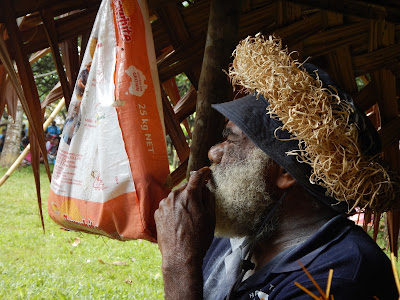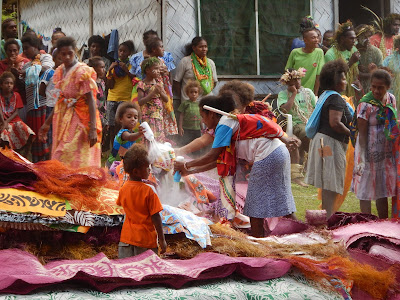Weddings, or “mareds” in Bislama, are a significant part of kastom here in Vanuatu. It usually takes a few years to save up in preparation for one. You are expected to feed the whole Northeast Ambae community a few meals and collect enough mats to pay the bride price and the new married couple. The two main elements of payment are woven pandanas mats and pig tusks. Throw in some yams, live pigs, and other island currency, and you’ve got yourself a fair payment. The value of these things add up to thousands of US dollars and are shared out among the families. Mats are kept in rotation throughout the community and the process continues with the next mared. Right now it’s wedding season! Since school let out, there have been 5 mareds in Lolovenue with a few more before February. I love mareds because they are joy-filled gatherings of dancing, laughter, tradition, and gudfala kakae. And anyone who’s anyone goes, so you get to shake hands with every man and woman and play with all the cute babies. Most recently was Dexter and Edina’s mared. They both live in Vila, but can back to have a proper island wedding. He is half man Aneityum, so a whole squad of his family and friends took ships up to Ambae to celebrate. This made it a fun fusion of kastom from both places!
On Ambae, mareds are 2-3 days long. Day one is always the pig killings. In order to have a kastom wedding, you must ceremoniously kill at least one pig, earning a chiefly title. Edina’s papa Selwyn Tavoa has a high chiefly ranking, so I was the only one surprised to see eight pigs lined up for her to kill. I found out my mama killed 10 at her wedding! Another reason, as if I needed one, to prove that she is a badass. Edina killed the pigs in the traditional way - with blows to the head with a wooden club. We all drank kava and returned home that night with fresh pig to cook for dinner.
The next morning we walked back to Lolomanganda for day 2, the kastom mared. The day always starts at the bride’s parents’ village with my favorite part, bolo. Bolo is a kastom dance where you pace back and forth in a group. There are a few men in the middle who lead the chants and stick around for the whole thing, but everyone else is free to join and leave as they please throughout the 4+ hours. A simple recipe: two steps to the left, two steps to the right, hands clapping to a complementary beat, traditional tunes sung in harmony, and everyone in high spirits. Man, I love bolo! They sing so many ancient Ambae songs and I’m sure the words are beautiful, but because I’m clueless on that end, I get to enjoy their voices as another instrument. An oldfala or two walk around passing out sips of ginger beer or palm wine or whatever was been brewed special for the event. Men and women are already drinking kava, even though it’s 10 am. I tried this at a pig killing once, but spent the whole day in hazy (albeit happy) uselessness.


At some points during bolo, the energy is uncontrollable and instead of stepping back and forth, everyone is hopping and stomping and dancing! Women are swinging pieces of calico over their heads, men are hooting and animal calling, and we’re all immersed in a dust cloud of pure joy. Bolo is a magical feeling I’ll never forget. What makes it so special is that it happens at every kastom wedding, always has, and I have no doubt that it always will. Kastom has changed and weakened in many ways, but dancing bolo will never die.
I stuck around for most of the Bolo because I know this may be one of my last chances to partake in the ritual. Until, as I’ve been made to promise over and over again, I find a man and bring him back to Ambae for a kastom mared ceremony of my own. It was a sweaty, dusty, hell of a time. I was confused when we all started shifting our bolo over to the earth ovens where they cooked some of the pig from the day before. The men started lifting up the thatched roof of the bush kitchen and we all carried it back over to the dance floor, still maintaining the two steps left, two steps right routine. We held up the roof and danced with it while everyone went wild and eventually scooted over to a burning fire and plopped the roof down on top of it. I had never seen this! I later learned that this is a rare kastom that happens when the daughter of a bigfala chief gets married. And just when I was certain that if you’ve seen a dozen bride price ceremonies, you’ve seen em all!
The bolo continues on as the mama’s mat ceremony begins. Every time, without fail, I find myself dumbfounded as I watch endless women come out of the woodworks with mats on their heads to converge in the center of the action. This tradition is only for the married women. They unfold their mats and place them on top of each other until you’ve got a ridiculous stack of beautiful hand-woven, hand painted mats. This is only a fraction of the mats floating around the community, another fact that blows my mind. I love that mats hold currency here because they indirectly give women a sense of value – mat making is purely a woman’s sport. Once the hundreds of mats are placed on top of each other, they are folded up and will travel to the next location. Now the bride sits in a chair with a big umbrella leaf on her head and everyone lines up and puts more mats on her head.
 |
| mats on mats on mats |



Some more of my favorite wedding traditions: all of the aunts of the bride and the groom come together with the bride in a small house. They sing to her and cover her in coconut oil. After this, they each pair up with a woman from the other side of the family and cover each other in coconut oil. It’s all very silly and messy. Another auntie ritual is with a small dead pig. They pass it around, pretending it’s a baby that they are breastfeeding. Over the shirt, you’re hoping? Usually, but there is always one or two clown aunts that lift their shirt and put the mouth of the dead pig straight to her titty! She receives a roar of laughter in return. They put this dead pig on some woven coconut leaves along with taro, manioc, and yam. The women are inside the house and the uncles are outside. They begin a game of tug of war until the food has made it outside and everyone dances around it. In fact, there is a lot of dancing around things. During bolo, the women dance around it and the bride carries another dead pig on her back.





 |
| theres a human un |
 |
| little lavenda |
 |
| myra and her mama lorinette |
Once all of the activities wrap up, the trucks are loaded with the mats and everyone walks to the village where the man lives. Dexter is manAneityum but his uncle married womanAmbae, so they used this village to host part 2. It was a 45 minute bush walk to Lovuitakombola. When we arrived, bolo (led by a different set of big man) was already in action, so I joined in again! My mama claims that this one sugary iced coffee drink called Breaka is her medicine. This is almost as absurd as me claiming that bolo is mine. It just feels so good!
Once everyone arrives, there are more mats and pig tusks laid out. Then close family members sit on the mats and people cover them in calico and baby powder. Have I mentioned the bizarre role of baby powder in Vanuatu culture? Whenever there is a celebration, people cover each other in it! No clue how it all started, but it’s everywhere in Vanuatu! White dust clouds cover the party and everyone loves it. Sometimes a community clown such as John Biti will have his turn and everyone goes wild while they dose him in baby powder. After all of this, the man’s parents present the bride price. They had some Aneityum mats, yams, live pigs, and a huge dead cow that they brought out! Never seen that before. There were a few speeches made by the two papas and my papa. My papa’s toktok was a long, drawn-out, half-drunken ramble about how this wedding built a bridge between Aneityum and Ambae. It was funny watching his words wander in circles, getting plenty of laughs along the way. The rest of the day was eating, drinking kava, dancing, and hanging out until the sun went down and it was time to go home.
 |
bolo forever!
 |
more mats!
|
|
 |
rolin and my mama
|
 |
baby powder dump
|
At one point, the bride’s papa Selwyn gave a speech. The day before he had told me that some people were saying he was a poison man, or someone who does black magic, and he was deeply offended. As you can imagine, being labeled as a poison man is pretty taboo. He asked if he should bring it up and I advised him to avoid the subject and just be the kind, funny, oldfala that he is because it’s his daughter’s day. Well, when he stood up to talk, I thought “here goes!” He talked about how he cried all morning, but they were tears of joy. (everyone claps) And how lucky he was to have this beautiful celebration with the whole community. (everyone claps again) And how happy he is for his daughter and Dexter. (everyone claps and cheers) And also how he’s not a poison man. Selwyn!!!! Everyone was awkwardly silent, because what do you do? Clap? Yahoo, you’re not a poison man! It was a funny and uncomfortable moment frozen in time that soon dissipated into more music and dancing. But hilarious all the same.
Breakthrough, a Christian church group, is headquartered in Lovuitokambola. At the end of the night, they unloaded a truckload of garbage bags full of second hand clothes. They were giving them out for free. It turned into a madhouse! But a pretty civil one. Everyone was giddy with their free finds. Then they led devotion (I knew there was a catch!) and we all went home. An exhausting, but delightful 3 days!






























No comments:
Post a Comment